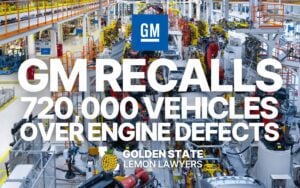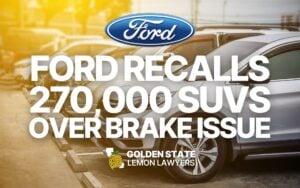California Lemon Law for Electric Vehicles: What EV Owners Need to Know
As electric vehicles (EVs) become more common, so do consumer complaints about recurring defects. Brands like Tesla, Rivian, Lucid, Ford, and other EV manufacturers have faced issues that may qualify under California’s Lemon Law. If you’re experiencing problems, you might be asking:
- “Does Lemon Law cover Tesla?”
- “Can I file a Lemon Law claim for battery problems?”
- “What should I do if my EV has defects?”
If your electric vehicle is constantly in the shop for repairs, California Lemon Law may protect you.
Common Electric Vehicle Defects That May Qualify Under Lemon Law
EVs rely on complex battery systems, software integrations, and advanced driving technology, which can introduce unique reliability issues compared to traditional gas-powered cars. Some of the most common problems include:
1. Battery Failure and Excessive Degradation
- EV batteries are designed to last for hundreds of thousands of miles, but some degrade much faster than expected.
- Certain models have experienced rapid range loss, making the vehicle unreliable for daily use.
- Complete battery failure can leave owners stranded, requiring costly replacements.
2. Charging and Range Issues
- Many EVs suffer from inconsistent charging speeds, where fast-charging works unreliably or not at all.
- Some vehicles fail to hold a charge as advertised, reducing their real-world range.
- Onboard charger malfunctions can prevent the car from charging, even when plugged into a properly functioning station.
3. Software Glitches and Malfunctions
- EVs rely heavily on software, and over-the-air updates can sometimes cause unintended performance issues.
- Problems with touchscreen controls, autopilot functions, navigation, and driver assistance systems are common complaints.
- Some software bugs have led to loss of regenerative braking, failure to detect obstacles, or incorrect battery range estimates.
4. Braking and Acceleration Problems
- Certain EVs have experienced phantom braking, where the vehicle suddenly slows down for no apparent reason.
- Regenerative braking malfunctions can affect how smoothly the car slows down, potentially leading to unsafe driving conditions.
- Sudden acceleration issues, throttle lag, or unexpected power cuts have been reported in some models.
5. Build Quality and Component Failures
- Some EVs suffer from loose panels, misaligned doors, or poorly sealed windows, leading to water leaks or excessive wind noise.
- Suspension issues, particularly in heavier EV models, can cause premature tire wear and rough handling.
- Owners have also reported malfunctioning heating and cooling systems, particularly in extreme weather conditions.
Does Your EV Qualify for a Lemon Law Claim?
If your electric vehicle has been repaired multiple times for the same issue or has been out of service for 30 or more days, you may qualify for a buyback, replacement, or cash settlement under California Lemon Law.
At Golden State Lemon Lawyers, we specialize in handling EV Lemon Law cases and work directly with manufacturers to get you the compensation you deserve. Best of all, you don’t pay unless we win.
Contact us today for a free case evaluation and find out if your EV qualifies under California’s Lemon Law.






